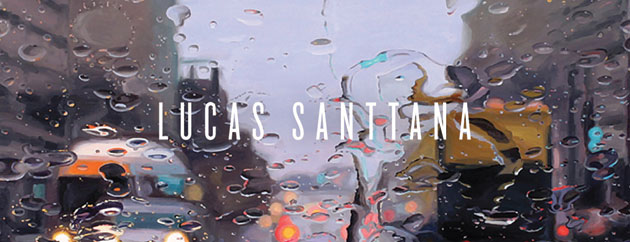
Review Lucas Santtana – O Deus Que Devasta Mas Tambem Cura
For his fifth studio effort O Deus Que Devasta Mas Tambem Cura (The God Who Devastates Also Cures), Lucas Santtana offers a largely cathartic record about love, loss and picking up the pieces of a broken relationship. Though his lyrics are often heartfelt, winding around simply-layered tunes to great effect, there is enough space here for some upbeat, dance-inducing numbers too, making for a fresh album which spans numerous styles and refuses to remain rooted in one genre alone.
From the off, Santtana seems keen to experiment with sounds he doesn’t regularly base his tunes around. Whereas funk was the order of the day in his first two albums Eletro Ben Dodô and Parada de Lucas, dub reigned supreme in 3 Sessions In a Greenhouse and Sem Nostalgia took the format of classic bossa nova and samba music with its focus on “voice and guitar”, O Deus immediately reveals itself to be a more ambitious effort, keen to blur the lines between genres and focus on symphonic elements to emotionally grip the listener to his more contemplative lyrics.
An ominous bass riff kicks off the album‘s title track, accompanying Santtana’s measured, drawn-out vocals to establish a soothing yet haunting start to the record. The brooding tone is well set by the languorous bass groove, while trumpeted sections intersperse the guitar sounds in the lead-up to the emphatic chorus, all of which make for a memorable introduction to the record.
As the album goes on, we increasingly see orchestral arrangements coming to dominate the song-design. In “E Sempre Bon se Lembrar” (It’s Always Good to Remember), deep cello and violin notes offer a wonderfully mellow backdrop to Santtana’s delicate vocals, while symphonic elements also shape the mood of the album’s stand-out effort “Para Onde Irá Essa Noite?” (Where Will This Evening Lead?) This blissfully melancholic tune sees the most heartfelt lyrics on the album, where Santtana laments that “o que não pode ser, não pode ser” (What cannot be, cannot be) The exquisite pacing of the song allows for simple electronic beats and pumping bass to build to an explosion of sound on the chorus, where Santtana’s emotion bursts through alongside great guitar riffs for a musical tour-de-force.
On other efforts, gloomy reminiscence is replaced by a pumping, dance-inducing vibe. The more upbeat guitar riffs and electronic vibes of “Músico” and “Jogos Madrugais” delicately balance the raw power of modern electronica with the understated sounds of orchestral strings, while “Dia de Furar Onda No Mar” is an effort which wouldn’t be out of place on Sem Nostalgia, defined by a samba style where delicate mandolin strumming and striking piano notes weave around the prominent riffs of the lead guitar.
Later in the album, Santtana straddles the line between the melancholic and the upbeat on the horn-led ska tune “Sé Pa Ska” and the tecnobrega “Éla e Belem”; in the latter, he contrasts the slower, orchestral tunes of the main tune with a vibrant, reggaeton-inspired chorus which traps you in a pulsating web of electronica beats. There is even space on the album for the jazzy effort “Vamos Andar Pela Cidade”, featuring a striking chorus of trumpets set alongside soft drum-beats.
Continuing the experimental trend, the album rounds off with the dance-infused track “O Paladino e Seu Cavalo Altar”, a re-imagining of My Tiger My Timing’s “This Is Not The Fire”. As Santtana proclaims that “meu amor é fogo imbatível” (my love is an unassailable fire), guitars once again spring to the forefront of the song alongside rhythmic drumming and sporadic electronic beats, making for an up-beat tone which is a fitting end to the album.
With O Deus, Santtana has come up with an extremely experimental effort which, overall, effectively blends orchestral tunes with modern beats and riffs. The use of symphonic ballads heightens the emotion of the more introspective songs, while the more dance-infused tracks allow for some respite from the melancholy of the album, with genre-spanning tunes like “Sé Pa Ska” offering compelling tweaks to the album formula.
Unfortunately, the unity of the album is at times compromised by this relentless experimentation; there is no real discernible flow between songs, with the mood set by a slower song often punctuated by an upbeat track which follows it, and this stops the album sounding like one seamless movement where each individual element feels part of a larger whole. Regardless, the sheer strength of album highlights like “Para Donde Ira…” and “Músico” more than make up for this lack of harmony, making for a compelling, introspective trip into the wonders and pitfalls of love.
O Deus Que Devasta Mas Tambem Cura is available from Amazon, iTunes and can be streamed from Soundcloud
Follow Sounds and Colours: Facebook / Twitter / Instagram / Mixcloud / Soundcloud / Bandcamp
Subscribe to the Sounds and Colours Newsletter for regular updates, news and competitions bringing the best of Latin American culture direct to your Inbox.

